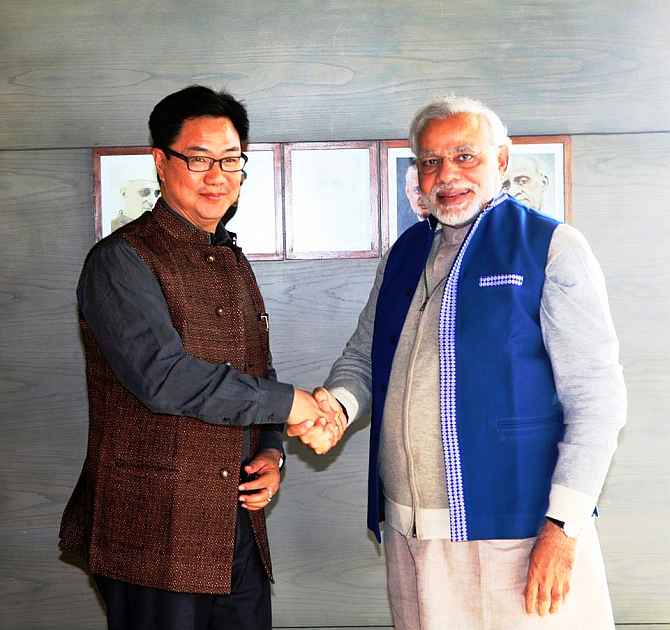
‘We’re not pursuing an expansionist foreign policy; we’re not going to have an aggressive policy. But that does stop us from developing our own area; by not developing or strengthening our area along the Indo-China border, we are indirectly conceding these areas to the other side (China).’
‘Every country has a policy of settling populations in their border areas to secure the border. In India, the previous government followed the reverse policy, telling people not to go to the border areas.’
‘We have a huge task at hand. It is not easy to ensure connectivity in the border areas because for the last 68 years we have not done enough. That is why it is going to take time. But we must begin now.’
Minister of State for Home Kiren Rijiju speaks of his plans in this first of a two-part exclusive interview to Claude Arpi and Sheela Bhatt.
In 2008, Rediff.com spoke to Kiren Rijiju, then a member of the ‘young brigade’ in the 14th Lok Sabha. At 38, he was considered one of the most outspoken parliamentarians of his generation. He is not only young but articulate, educated and a leader with clarity of thoughts as well.
Today, Rijiju has assumed new responsibilities. He has been appointed as minister of state in the ministry of home affairs to assist Rajnath Singh. More than ever, Rijiju is the ‘face of the north-east’ in Parliament and Narendra Modi’s Cabinet.
Rijiju spoke to Rediff.com’s Claude Arpi and Sheela Bhatt about his new responsibilities, the importance of having someone from the north-east in the home ministry, about the situation on India’s borders, the policies of the Modi government for the Himalayan belt and the meaning of Modi’s election as the new prime minister.
Click NEXT to read the interview…
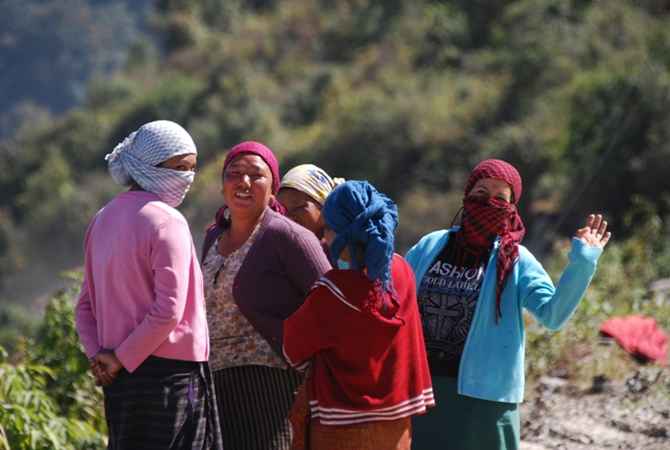
For the first time, someone from north-east is in the key post of minister of state for home affairs. How important is that?
When Narendra Modi, as the prime ministerial candidate, started his election campaign, one of his main concerns was the security of the north-east. Modiji had a plan to develop north-east, but without security being in place, development was not possible.
The yardstick is that the security of north-eastern states must be taken as a priority and then catapult the whole region into a developmental stage, which will be at par with the rest of the country; especially at par with the western part of India.
The prime minister made a point: eastern India and north-east India must get priority. You can look at it from two angles: my being in the ministry of home affairs gives importance to the north-east and, then, being from Arunachal Pradesh, it shows the strategic importance of this state. Geopolitically, Arunachal figures very high in the agenda of our government.
The people of Arunachal Pradesh used to feel that Delhi is very far, not only in terms of geographical distance but also psychologically, in terms of understanding. Now, being a minister in the ministry of home affairs, the gap has been reduced, if not bridged.
Some people have jokingly said that the capital of India should be shifted to the north-east. By appointing you, has the north-east come to Delhi?
It is definitely closer...
What kind of reaction did you get after your appointment?
There was fantastic reaction from all sides; from the people who are involved in the security affairs, the people working on various social issues and of course the government agencies, the state governments. Everybody has reacted positively, across the political spectrum, on my becoming minister of state in the home ministry.
…
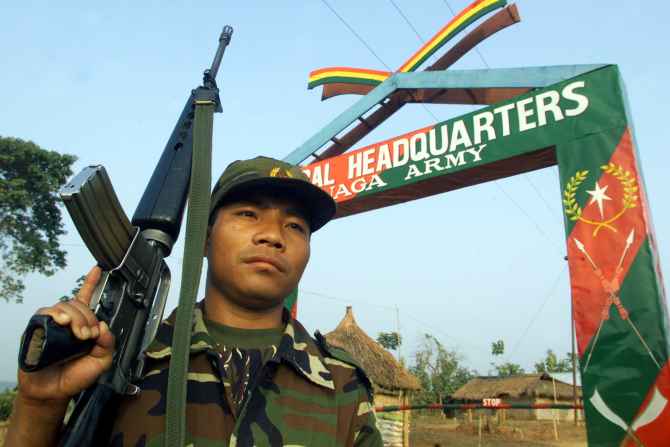
What are the priorities of your ministry, apart from the north-east?
My objective is very clear. The entire north-eastern region is infested with problems of insurgency. There are lots of factions and those factions are further broken up into multiple sub-factions; there are more than 40 different groups. My initial efforts would be to bring everybody on board, into the mainstream.
It is very complex; it is not easy. I know that I have a very difficult task on hand. I have to make them understand that it is their own man sitting in New Delhi. They always complained that Delhi doesn’t take care of the north-eastern region; now their own man (Kiren Rijiju) is sitting here. I will tell them: “I’m ready to talk to you, come into the mainstream and you’ll be a part of the whole idea of India, all parts of India can progress together”.
India cannot progress wholly if one region is isolated or left behind. To change the course of history, the various factions of the north-eastern region must come to the negotiating table.
That doesn’t mean that we are going to have a soft approach. India cannot afford to be a soft State. That doesn’t mean too that India is going to relax. While I welcome everybody with an open heart, if somebody still plays into the hands of anti-national groups or elements and try to take advantage of that situation, then it will be costly for them.
We cannot keep talking indefinitely just for the sake of talking. It would be a wastage of time. Life is short; if we waste time, it’s a crime. So I don’t believe in the idea of talking and talking with nothing happening.
That is for internal security.
On the external front, my immediate concern is how to increase our capacity along the international borders. The Indo-China border is a critical area. On the Indo-Myanmar border, definitely we’re not adequately involved. On the Indo-Bangladesh border, yes, our Border Security Force is guarding; but we still need to take care of the border fencing and so many other related issues.
The Indo-Bhutan border is normal, because of the friendly relations between the two countries. Our Sashastra Seema Bal forces are taking care of the border and Bhutan is cooperating with us; there is not much concern on that front.
Regarding the Indo-Nepal border, it is very porous. While our relations with Nepal are really ancient and culturally very close, there are issues which are not directly related to my concern; but they are related to other ministries.
The Indo-Pakistan area is also an area where our government needs to concentrate more.
What about Ladakh?
Ladakh is an area of concern too; my immediate concern is to concentrate on the Indo-China border. That concern means securing our territory. When I say we must strengthen our position on Indo-China border, it’s not in offensive terms. We don’t want any kind of confrontation; we don’t want a war.
We’re not pursuing an expansionist foreign policy; we’re not going to have an aggressive policy. But that does stop us from developing our own area; by not developing or strengthening our area along the Indo-China border, we are indirectly conceding these areas to the other side (China).
When I say strengthening the Indo-China border, it does not mean that we will take an aggressive position towards China. We definitely want friendly relations with China, but on an equal footing. The two countries must stand together on an equal footing. Nobody should have an advantageous or disadvantageous position. The previous government’s policy, of not developing areas close to Indo-China borders was a pessimistic policy.
…
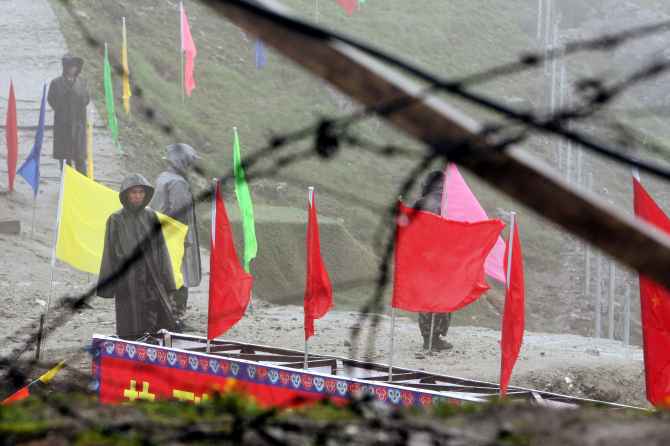
Developing means construction of roads and opening these areas to tourism?
When I say strengthening the border areas, it means development of infrastructure, roads, communication, other basic amenities; facilities for local people living in the border area. They should be provided with electricity, water, food, everything and of course we should also raise our military and paramilitary strength.
That is not to intimidate the other side; this is just securing our own side of the border. That is why when I say we need to increase our forces alongside the border, some people misread it as taking an aggressive stance. It’s not that. Every country has the sovereign right to develop its own territory and secure it.
The Chinese have done it on their side of the border?
Yes, the Chinese have done it. Why can’t we do it too? The Chinese have developed the entire Indo-China border right from Ladakh upto Nyingchi (a prefecture in Tibet). They have built world-class roads, world-class airports, world-class infrastructure.
And China is bringing the railways to Nyingchi…
Yes, I’m very positive about our government’s policy. While we strive to have good relations with China, we will not concede our own strength on the ground; I’m very clear about that.
When you were the MP you were most openly speaking about Chinese intrusions. Now that you are responsible for the Indo-Tibetan Border Police Force, which mans most of the passes, what are you going to do practically to stop the intrusions?
Number one, the Indo Tibetan Border Police force is not as big as the BSF or the Central Reserve Police Force. They’re just below one lakh personnel. We must ensure that the capacity of the ITBP, which has been mandated to guard the Indo-China border, is increased. This will get the support of my ministry.
The forces guarding the Indo-China border must be strengthened at any cost. It is a huge area, right from Arunachal Pradesh to Ladakh; the ITBP is guarding the borders in the toughest terrain. Today, their numbers are too thin.
Do you plan to include the local communities, like the army has done with the Arunachal Scouts, to help protect the borders?
Yes. The practice, carried out by the SSB where the local people are given some training and are involved in guarding the border areas, is very good. And we have to continue it. The activities of ITBP forces, and the security training involving the local people living along the borders, needs to be enhanced so that local people are involved in securing their own territory.
Secondly, we must distinguish between people living in the border areas and other people; those who live extremely close to the border must be taken as a part of the security forces. They must be given extra facilities by the government because they’re living close to the border areas. They are guarding the borders, they are the sentinels of the country. So they need to be treated on a different footing.
…
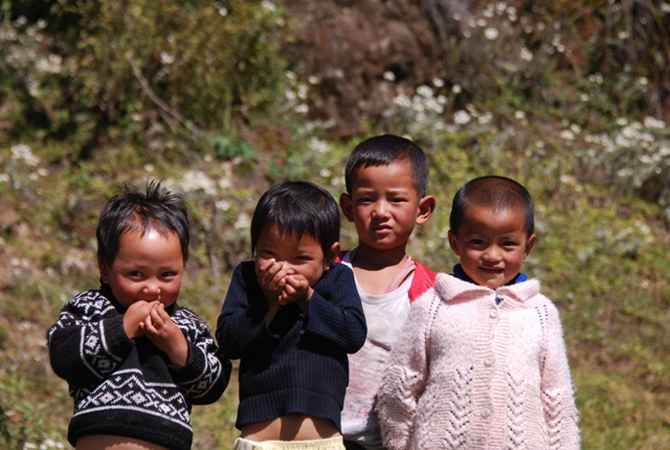
We have been told that a lot of people are moving away from the borders, from Demchok in Ladakh for example, simply because they’re fed up of being harassed by the Chinese who are intruding. What will you do to stop emigration from the border areas?
If we manage to strengthen our forces along the border, I’m sure that it can take care of the local fear. But if we are unable to provide basic necessities to the people living in the border areas, then definitely people will run away.
In this modern world, people need basic amenities for their livelihood; if these basic facilities such as education, health, road, communication services, drinking water supply are not made available, people will migrate. These basic facilities should be available to those areas; if we don’t do it, some day the whole border area will be without any civilian population.
People will migrate to more developed areas. These areas should be treated in a totally different way. These are strategic locations for the government. These people cannot be treated like in the rest of the country.
Does the government think of settling populations in border areas?
I must tell you one thing. Every country has a policy of settling populations in their border areas to secure the border. In India, the previous government followed the reverse policy, telling people not to go to the border areas. Foreigners cannot go to border areas, local people cannot go to border areas, official are restricted from going to border areas, etc.
Do they need special permission to go?
Yes. Many governors and chief ministers and other senior officials understand this point; many people dealing with security issues are talking on the same lines; I have myself been saying this for the last so many years: the policy that India adopted for decades is not helpful for our national security.
We need to reverse it. But populating the border areas or bringing more people in these areas, should not be seen as an aggressive policy. We are just securing our own borders, we’re stopping people from migrating; that means every border area of India must be taken care of; it is not aggressive in any way. My idea, my policy, is not aggressive in nature but positive and in the national interest.
…
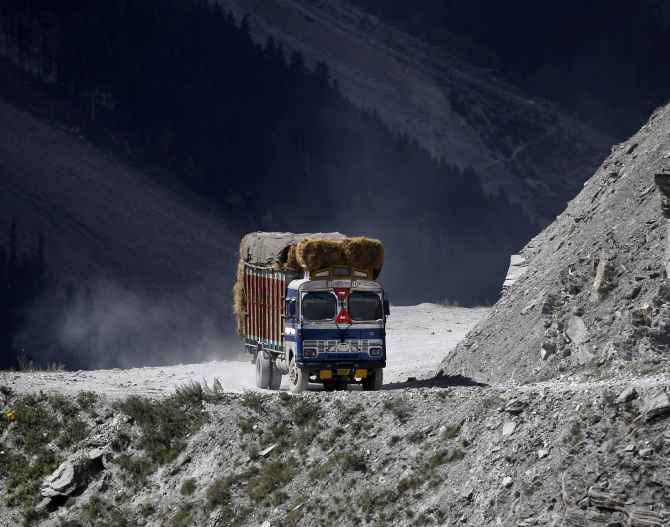
Is it true that when Rajnath Singh decided to visit all the border areas, he was told that for some places in Arunachal, it would take two-three weeks to reach the border? How will you tackle these issues?
We have a huge task on hand. It is not easy to ensure connectivity in the border areas because for the last 68 years we have not done enough. That is why it is going to take time. But we must begin now. We’re late but I hope we’re not too late. The new government will put some emphasis on that.
If an incident, like in the Depsang Plains in Ladakh last year (when the Chinese intruded), takes place again, how will you respond?
My point is very clear. If the entire unattended territories are taken care of by settlement, then such a situation won’t come. The situation arises because the territory is unattended. It is left open and empty.
Can you confirm that there were some Chinese intrusions in Upper Subansiri district?
Yes, reports keep coming in that because the border area is not delimitated. Whosoever has more presence, they take advantage.
Watch out for part 2 of the interview tomorrow